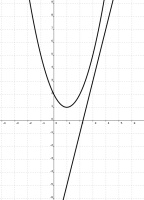Puzzles
20 December
p(x) is a polynomial with integer coefficients such that:
- p(0) > 0;
- if x is a real number,
4x – 9 < p(x) < x2 – 2x + 2.
What is p(23)?
Show answer
Hide answer
Plotting \(y = 4x - 9\) and \(y = x^2-2x+2\) gives:
As \(p(x)\) has integer coefficients, \(p(3)\) must be an integer. If you click to view a larger version of the image, you'll see that the only option for \(p(3)\) that satisfies
\(4x-9<p(x)<x^2-2x+2\) is \(p(3)=4\).
As \(p(x)>4x-9\), it must at least a polynomial of degree 1. As \(p(x)<x^2-2x+2\), it must be at most a polynomial of degree 2. Playing with coefficients, you can see that
\(p(x)\) is either \(x^2-2x+1\) or \(4x-8\). \(4x-8\) is negative when \(x=0\), so \(p(x)=x^2-2x+1\) and \(p(23)\) is 484.
24 December
The expression \((3x-1)^2\) can be expanded to give \(9x^2-6x+1\). The
sum of the coefficients in this expansion is \(9-6+1=4\).
What is the sum of the coefficients in the expansion of \((3x-1)^7\)?
Show answer
Hide answer
The sum of the coefficients can be worked out by substituting \(x=1\) into the polynomial, so the sum of the coefficients is \((3-1)^7\), or 128.
8 December
The equation \(x^5 - 7x^4 - 27x^3 + 175x^2 + 218x = 840\) has five real solutions. What is the product of all these solutions?
Show answer & extension
Hide answer & extension
The product of all the solutions is 840.
Expanding \((x-\alpha)(x-\beta)(x-\gamma)(x-\delta)(x-\epsilon)=0\) gives \(x^5 + \dots = \alpha\beta\gamma\delta\epsilon\). As long as the
coefficient of \(x^5\) is 1, the constant term when written like this will be the product of all the solutions (for this to always work, you will need to include repeated solutions and complex solutions.)
Extension
The equation \(x^8 - 19x^7 + 126x^6 - 294x^5 - 231x^4 + 1869x^3 - 1576x^2 - 1556x + 1680=0\) has eight real solutions. What is the product of all these solutions?



